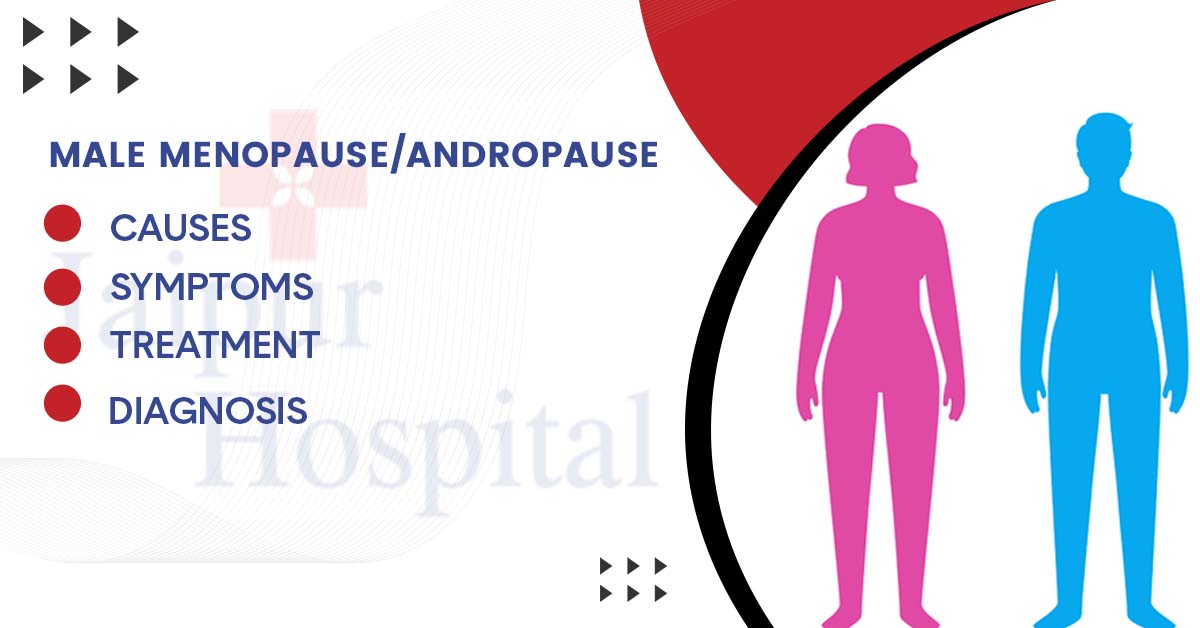Overview: Male Menopause/Andropause:
Testosterone is the hormone that gives males their deep voice, facial and body hair, and their muscular build. Men’s testosterone levels will decline as they age, especially beyond the age of 30. However, this is typically a slow and progressive decline of 1% to 2% per year.
Andropause is more frequently referred to as “male menopause.” It describes alterations in male hormone levels brought on by aging. The terms testosterone deficiency, androgen deficiency, and late-onset hypogonadism all refer to the same symptoms.
In men 50 years of age or older, male menopause is characterized by a decline in testosterone production. It frequently has a connection to hypogonadism. Both illnesses have symptoms that are related to low testosterone levels.
In men, the testes are where testosterone is produced. You get more from it than just sex drive. Additionally, it supports puberty changes, supports your mental and physical energy, supports muscle mass, supports your fight-or-flight response, and supports other essential evolutionary traits.
Male Menopause Causes:
In addition to controlling libido, sperm generation, and muscle growth, testosterone is crucial for maintaining bone health and blood formation in males. It is produced in the testes. As men age, their ability to generate sperm and testosterone levels both tend to decline. However, in addition to aging, various lifestyle choices or psychological issues may also contribute to a decline in testosterone levels.
These consist of
- Stress, depression, or anxiety can cause erectile dysfunction, loss of libido, mood swings, divorce, money troubles, worrying about aging parents, and a “midlife crisis,” in which men believe they have reached a halfway point in life. Stress, depression, or anxiety can also result from worries about what one has accomplished thus far, whether in one’s career or personal life.
- Erectile dysfunction can be brought on by both psychological causes and changes in the blood vessels.
- Lack of sleep.
- A poor diet.
- Lack of exercise.
- Drinking too much alcohol.
- Smoking
- Low self-esteem.
- Late-onset hypogonadism.
Male Menopause Symptoms:
Physical, sexual, and psychological issues can result from male menopause. As you age, they usually get worse. They may consist of
- low-energy.
- depression or sadness.
- decreased motivation.
- lowered self-confidence.
- difficulty concentrating.
- insomnia or difficulty sleeping.
- increased body fat.
- Physical weakness and a reduction of muscle mass.
- gynecomastia, or the development of breasts.
- decreased bone density.
- erectile dysfunction.
- reduced libido.
- Infertility
In addition, you can feel hot flashes, thinning body hair, smaller testicles, or swollen or painful breasts. Osteoporosis and low testosterone levels related to male menopause have been connected. Your bones become brittle and feeble as a result of this condition. These symptoms are uncommon.
Is Andropause in Men Similar to Menopause in Women?
Menopause and andropause both share some traits. The relationship between a woman’s ovaries, estrogen, brain, and pituitary—a tiny structure at the base of the brain necessary for hormone production—and a man’s testicles, testosterone, brain, and pituitary—explains the similarities. But one significant distinction is that not all men go through andropause. In contrast, menopause in women is common and expected, with the hormones’ shut-down occurring as a predictable event around age 50.
What are The Risks of Ignoring Andropause?
Andropause is frequently misdiagnosed as a simple “mid-life crisis” because it happens at a time when men start to doubt their purpose in life and past accomplishments. The signs of andropause, however, can cause a slow decline in health if neglected.
This may result in altered fat distribution, a loss of bone and muscle mass (osteoporosis), and shorter stature. This can then result in frailty and early aging.
Andropause Diagnosis:
To determine whether your symptoms correspond to those of men with low testosterone, a doctor will inquire about how you are feeling. The level of testosterone in the blood is then determined using a blood test. Before identifying andropause, your doctor will likely order tests to rule out other conditions that could be causing low testosterone levels, such as hypogonadism, which slows down sexual growth and development, diabetes, and high blood pressure.
The following steps will help the doctor determine whether a man is experiencing male “menopause”:
- Perform a physical exam.
- Ask about symptoms.
- Request tests to rule out any health issues that could be causing the situation.
- Get blood tests done, including one that checks your testosterone levels.
Male Menopause Treatment:
Men experiencing andropause are most often treated by replacing testosterone in their blood. In many circumstances, this treatment may assist enhance the quality of life while also relieving symptoms. Lifestyle adjustments like increased exercise, reduced stress, and a healthy diet are also beneficial. Given the risks associated with treatment, your doctor will assist you in determining whether testosterone therapy is appropriate for you.
There are numerous forms of testosterone available, including skin patches, pills, gels, and injections. When deciding which course of treatment is best for you, your doctor will frequently take into account your lifestyle. Once the initial therapy has started, it will be crucial to have follow-up appointments with your doctor. At subsequent appointments, your doctor will assess how you are responding to the treatment and make any necessary modifications.
- Skin patches: The hormone testosterone is delivered to wearers through the skin of the patch. A gradual, steady release of testosterone into the bloodstream is made possible by the patch. On the back, abdomen, upper arms, or thighs, it is put on once a day to a dry area of skin.
- Testosterone gel: The skin also receives this therapy directly, typically on the arms. One must be careful to wash their hands after each application of the gel because it could spread to other people through skin contact. Unwashed clothing that contains traces of medication should also be kept out of children’s reach.
- Capsules: This is yet another testosterone replacement option, to be taken twice daily after meals. Men who have liver disease, impaired liver function, severe heart or kidney disease, or excessive blood calcium levels should stay away from testosterone supplements.
- Testosterone injections: Every two to four weeks, testosterone (both testosterone cypionate and testosterone enanthate) is injected into the muscle as part of this treatment. Variations in testosterone levels could result in mood swings.
Self-help in Overcoming the Symptoms of Andropause:
- Lose weight
One of the most changeable risk factors for low testosterone is a smaller waist circumference. As a man’s testosterone level declines, his Body Mass Index (BMI) rises. Reduced testosterone is linked to male obesity.
- Stress less
Your body releases cortisol during times of stress, which raises blood sugar. The effects of testosterone can be countered by this hormone. This is because stress (and disease states) hasten the degeneration of “Leydig cells,” which are found in the testes and are in charge of producing testosterone.
- Consume more Zinc
Zinc needs must be met for healthy reproduction and hormonal balance. The pituitary gland cannot release the chemicals that urge the testes to make testosterone if zinc is not present. Lowered sperm production, decreased muscle endurance, and reduced testosterone levels can all result from inadequate zinc intake.
- Watch your sugar intake
After consuming sugar, testosterone levels drop. According to studies, testosterone levels decrease by 25% for up to two hours after consuming 75g of sugar.
- Regular exercises
Regular exercise can increase testosterone levels and slow the loss of this hormone. Increased testosterone may be a result of high-intensity exercise and intermittent fasting.
- Sleep matters
Sleep is when testosterone is mostly created. The amount of sleep a man gets at night can help forecast his morning testosterone levels in older men. Therefore, getting enough restful sleep is important.
- Limit or avoid alcohol
In addition to lowering testosterone levels, drinking alcohol can have an impact on libido and erectile function. Alcohol abuse can raise estrogen levels as well.
- Healthy diet
Increased consumption of fruits, vegetables, nuts, seeds, and fiber will support estrogen and testosterone balance.


